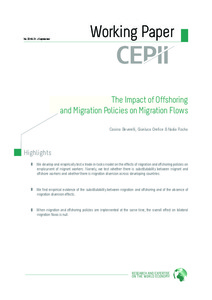The impact of offshoring and migration policies on migration flows
"In a theoretical framework that extends Ottaviano et al. (2013) to three countries, we investigate two research questions. First, whether offshore workers directly compete with migrants from the same origin country to perform tasks of low/medium complexity (migration-offshoring substitutabilit...
| Main Authors: | , , |
|---|---|
| Institution: | ETUI-European Trade Union Institute |
| Format: | TEXT |
| Language: | English |
| Published: |
Paris
2016
CEPII |
| Subjects: | |
| Online Access: | https://www.labourline.org/KENTIKA-19101908124919291809-The-impact-of-offshoring-and-m.htm |
| Summary: | "In a theoretical framework that extends Ottaviano et al. (2013) to three countries, we investigate two research questions. First, whether offshore workers directly compete with migrants from the same origin country to perform tasks of low/medium complexity (migration-offshoring substitutability). Second, whether migrants from different origin countries compete among each other (migration diversion). These questions are addressed empirically using a dataset covering 28 OECD high-income countries (as destinations of migrants flows) and 144 non high-income countries (as origins of migrant flows) for the period 1996-2010. The empirical results suggest strong direct substitutability between migrant and offshore workers from the same origin country and the absence of policy driven migration diversion across different origin countries." |
|---|---|
| Physical Description: | 59 p. Digital |

